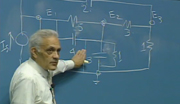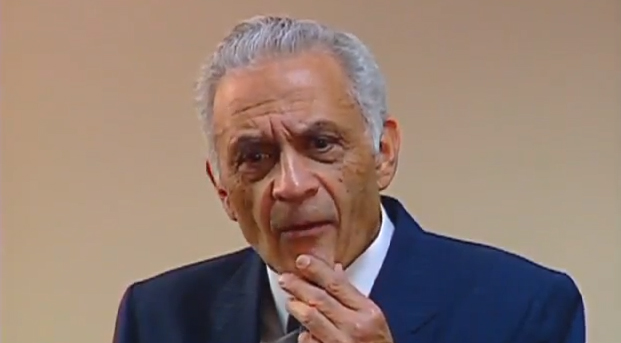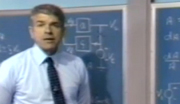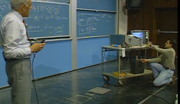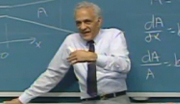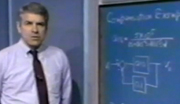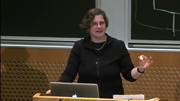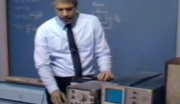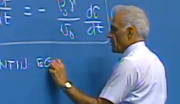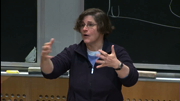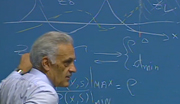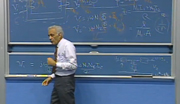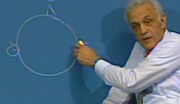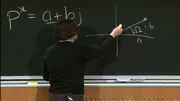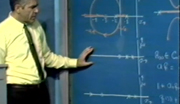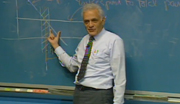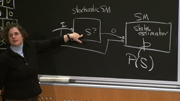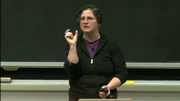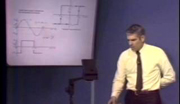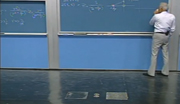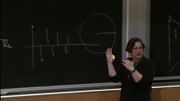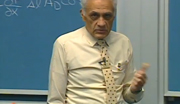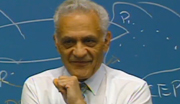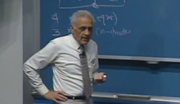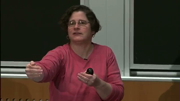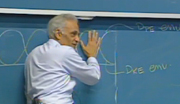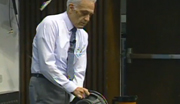Amar Bose: 6.312 Lecture 27
AMAR G. BOSE: Have you enjoyed?
CLASS: Yes.
AMAR G. BOSE: OK. We have a little business today that has to do with the class. And then I want to take off my academic hat, and tell you things that I wish somebody had told me when I was graduating. I won't to be able to tell you all of them, I'm sure, because I could go on for hours with things that I wish I had been told at some point. But we'll get in as many as we can.
So let's start with that which had to do with the class. I promised you a demonstration that you would remember, perhaps, forever. And then it is very much related to something that you studied. But we'll put a different light on the effects. And we'll talk about that.
What we have is a recording. Very poor quality, but that doesn't make any difference. It was made about 30 years ago in my living room. We had this 1/8 of a sphere, which was really well equalized, well designed by any standard. And we decided to find out what a room really did to things, like the sound reproduced from a loudspeaker or from you.
And we made this recording, played it through the loudspeaker, put a microphone out in normal listening position of the living room, took what was a mic and when it was recorded, and we recorded what went into the microphone, put it back into the speaker.
It came through again, recorded it. Put it back into the speaker. It came through again, up to six times. And I think you will hear the first time through.
Now mind you, it's sort of like a second time through because you're going through a room again. You're not listening over the headphones. Although, the normal modes in this room aren't at the same frequency, so going through the same system twice is much worse than going through two different ones. But you'll get the message.
Basically, you'll hear the, so-called, original. And it's music first, speech next, speech sample next and pink noise, which is equal to energy per percentage spectrum, third. And then you'll hear the second round of that will be after it's gone through twice and the third time you hear it, the three, they will have gone through six times.
Now what I want you to concentrate on is how each of these sounds deteriorates as it goes through this process. See if you can't relate the music deterioration to the speech deterioration to the noise deterioration. And I will put it on the board what it seemed like something obvious to you, may not seem so obvious by the time the demonstration get to the end.
I will put on a little matrix telling which one is playing. So let's go. The original.
[AUDIO PLAYBACK]
[MUSIC START]
[MUSIC END]
[SPEECH START]
-Renting a car in Athens is no more complicated than renting one in Miami Beach. The only requirements are an American driver's license and $50 down. The rental fee is less than $3 a day, to which is added a mileage fee and the cost of gasoline.
I hired a Volkswagen. And the expense worked out to a neat $10 per 100 kilometers. It would have been less, no doubt, if I had adopted the Greek habit of turning off the engine on downgrades.
[SPEECH END]
[NOISE START]
[NOISE END]
[MUSIC START]
[MUSIC END]
[SPEECH START]
-Renting a car in Athens is no more complicated than renting one in Miami Beach. The only requirements are an American driver's license and $50 down. The rental fee is less than $3 a day, to which is added a mileage fee and the cost of gasoline.
I hired a Volkswagen, and the expense worked out to a neat $10 per 100 kilometers. It would have been less, no doubt, if I had adopted the Greek habit of turning off the engine on downgrades.
[SPEECH END]
[NOISE START]
[NOISE END]
[END AUDIO PLAYBACK]
AMAR G. BOSE: And now the reason for the chart. Go ahead.
[BEGIN AUDIO PLAYBACK]
[MUSIC START]
AMAR G. BOSE: That is "Carmen."
[MUSIC END]
[SPEECH START]
AMAR G. BOSE: Certain similarity of Carmen to speech?
[LAUGHTER]
[END SPEECH]
AMAR G. BOSE: This one, think about strongly. It tells the whole story.
[START NOISE]
[END NOISE]
[END AUDIO PLAYBACK]
AMAR G. BOSE: Now I'm sure you know what this is. It's the normal modes. You go through a frequency response once, you go through it twice, you square it, right? You cascaded the same function with itself, you get the square. And so it goes each time.
And if you have a filter that is reasonably narrow-band, when you square that thing, it becomes something that goes way up here. It becomes a much higher-Q. You can figure out, I didn't happen to do it this term, but it's easy to figure out the Q of these normal modes of the room because you figured out reverberation time already.
And that means, as you saw in the derivation, that you turn on a sine wave in a room, it decays exponentially. Well that's exactly what you would have if you had a two-pole network and which has a response that looks like that anyway. And twice this distance is the bandwidth. So twice the decay rate that it decays at.
The alpha there will give you the bandwidth of the normal modes. And they're pretty high-Q. And you may not have noticed or paid attention to the first time, but when we got to the sixth time, it took time for the sound to build up. It didn't just start right on like the original music did. It built up.
And then when it finished, it died out slowly because the Q of these filters getting larger each time caused this fellow, the bandwidth, to get much smaller. And therefore, it died out much, much more slowly.
If you try that same experiment with other equipment, like an amplifier, you go through 40 times. And if you adjust it so that the frequency response is OK, if it's a few DB down or something, then every time that gets amplified, you will hear it. But if you adjust the frequency, it's fine. You can go through an amplifier 40 times and not know it, except maybe for noise level.
And so it's a way of putting a magnifying glass on what's causing you the problem, one could argue here. And you'll just have to take our word for it that we worried about that and paid attention to it. That you're going through two things, yes, all the amplifiers and all.
We actually did go through all of them quite a number times. But you're also going through the loud speaker. But take my word for it, what you heard was not that. It was, in fact, the normal modes of the room.
Before changing completely from the academic side now, I just would like to say a few words with respect to what I regard as excellent performance of the teaching assistants. Yesterday, just to give you an idea, there was a meeting to discuss grades.
Snow they actually prepared all the numbers every which way you could possibly look at them, columns and columns and columns. And a meeting like this could have lasted 15 minutes after all the preparation that was done. It lasted five hours because there was enormous discussion in each case.
What do we know about the individual? Do the quizzes really represent what that person knows about the subject? Did that particular person have a really bad time in his term in which the average came down because of that?
And all of that only happens when somebody cares. And these teaching assistants have, just like you, all the exams coming up. They have a lot to do. And they could have recommended that it be a 15-minute meeting. But they didn't. So I have particular thanks to all of them, to Uzma Makhdumi. Going to come on up. [LAUGHS]
[APPLAUSE]
AMAR G. BOSE: To [? Preshan Singh ?] To Manish Doyal. To the head teaching assistant, Carlos Cabrera. Where are you?
And also, by the way, in terms of hours that they spent, they spent many more hours than they were either compensated for or assigned to on this task. I know they enjoyed it. I hope they have learned something.
And I'm going to ask each one of them if they would like to say a few words in a moment. But there's another person I would like to acknowledge. And that is Neal Lackritz, who was a teaching assistant in this subject a few times, did a magnificent job. Neil?
[APPLAUSE]
AMAR G. BOSE: Neil helped out this term with the Bose people and the WPI. He taught the same course here at Bose. And as I say, he did a fantastic job last year at MIT, and year before that, and here and now. Yes?
SPEAKER 1: [? Hannos. ?]
AMAR G. BOSE: [? Hannos, ?] oh, [? Hannos ?] isn't here. Yeah, yeah, by all means. Is he here?
SPEAKER 1: Yeah, right here.
AMAR G. BOSE: Whoa!
[APPLAUSE AND CHEERS]
AMAR G. BOSE: [LAUGHS] [UNINTELLIGIBLE]. Sorry about that. I was looking at the faces here. And he had just gone to pick up his brother at the-- boy, you must have really--
[LAUGHTER]
AMAR G. BOSE: --woo, really traveled. But that's not why I missed you. I forgot. [LAUGHS] Thank you, thank you, thank you.
I just wondered if any of you would like to just say a couple of words. [? Hannos ?] since you were last? You'd better come here, maybe. This is totally unplanned, so I--
[? HANNOS: ?] I just wanted to say it was a great experience--
AMAR G. BOSE: This works, by the way.
[LAUGHTER]
[? HANNOS: ?] Does it work? OK, yeah.
AMAR G. BOSE: Yeah.
[? HANNOS: ?] It's an experience, teaching. I taught last year. And I learned a lot. And taught this year, and I learned even more.
Neal was my TA when I took it, so I certainly learned quite a bit from him as well. And it's really quite a pleasure. And all the time we put into it is, from my perspective, worth it. And I hope you feel the same way.
Many of you, as students, would be good teaching assistants. And at the end, we'd like you sign up, if you have an interest, for next year.
And lots of students who I know bypass the teaching assistants role because they want to do research, as Dr. Bose has told us. I have been teacher. And knowing how much I enjoy it and how much I benefit from it, I suggest it to all of you, whether you continue with your studies or not, because there's nothing that teaches you the material better than teaching.
And I'll tell you, I was frightfully nervous the first time I taught. And each time the semester starts, I'm nervous also because I'm sure most of you are at a much higher level than I am. So you just have to stand up there and be confident and say, no, even if you are right.
[LAUGHTER]
[? HANNOS: ?] So thank you, I really did enjoy it.
[APPLAUSE]
[? PRESHAN SINGH: ?] [UNINTELLIGIBLE] I agree with that. There's really nothing like teaching. You really don't know how well you know something until you have to teach it to somebody else. And like I said, it's a scary experience at first.
Like [? Hannos ?], this is my second time around. And every single time I think, I've gone through this course. I've learned just as much-- I've learned actually more, I think, in teaching the class than I had, as a student, learning the class. And it's just I agree with [? Hannos, ?] if you get a chance, please do take the time to teach.
It's an incredible experience because not only do you learn from it-- I've learned not only from teaching, by listening to Dr. Bose and the other teaching assistants, but I learned a lot from you guys. Everybody sees problems in different ways. Everybody has their own unique solution to a given problem. And the more I see of that, the more amazed I see a problem.
And it's just incredible. So I'd just like to thank Dr. Bose and the teaching staff and all of you guys for making this such a great experience for me. Thanks.
[APPLAUSE]
AMAR G. BOSE: Uzma?
UZMA MAKHDUMI: Well actually, I just wanted to agree with [? Hannos ?] and [? Preshan ?].
[LAUGHTER]
UZMA MAKHDUMI: Also, I'd like to add that I was also very nervous when I started out teaching. I don't think I would have been able to stand up and talk to you guys, unless I had taught this semester. It was an excellent experience just standing up and learning from students and learning from the other teaching assistants and, of course, Dr. Bose.
I was actually taking a number of classes this semester. And it was a very busy schedule for me. But I think this was the most enjoyable thing that I did this semester.
And I don't want to repeat what [? Hannos ?] and [? Preshan ?] said, but I'd just like to thank all of you and teaching staff and, of course, Dr. Bose. Thank you, very much, once again. And try teaching, if you can, and even if you're taking lots of classes.
[LAUGHTER]
[APPLAUSE]
AMAR G. BOSE: How many did you take again? How many?
UZMA MAKHDUMI: Four.
AMAR G. BOSE: Woo! She was taking five classes at the same time. Manish?
MANISH DOYAL: I'm going to tell you guys a couple really short stories, antidotes to illustrate what the other TAs said.
[LAUGHTER]
MANISH DOYAL: I can't think of a better way to make an impact on someone's career, the path that they're taking. Last year when I took the class, for a number of reasons, I was having a difficult time at MIT. And that manifested in all sorts of problems academically, lack of confidence, lack of concentration. I was really doubting myself.
And the class, as it was taught by Dr. Bose, really grabbed my interest. But even though I would sit in the lectures in awe, I would go to the problem sets and I would get stuck. I really struggled with the material.
And the person who really helped me out big time and pushed me along and taught me to believe in myself was Neal Lackritz. He wasn't my TA. I just went to him. I said, "Neal, I need some help." And he spent many, many hours with me.
Some of the best advice he gave me was, put your pencil down. Look at it. And think about what you want to do first. And I use that on every problem now.
And if you want to hear about how becoming a teaching assistant can make a difference in your understanding, well when I took the exams last year-- you guys think you stayed long. I was always one of the last ones to leave. I stayed really, really late. And I think I annoyed Neal a couple of times in doing so.
But when this semester rolled around, [? Hannos ?] said, "Look, we need you and Uzma to beta test the exam." "What? [? Hannos, ?] I've got a full load, man. I can't spend six hours like I did last year. There's no way. I can't do it."
He said, "Manish, look, you've got to take the test. We need your feedback. You and Uzma are the only people that can really give us an idea of where there are ambiguities, what needs to be clarified." So grudgingly, I took the test from him. And I set aside six hours because I said to myself, I'm not going to spend less than six hours. I really felt that it was going to take me that long.
But after having presented the material in class, after having sat with the graduate TAs and really preparing the material, I just noticed that, in lecture, I began to see things which I struggled with so tremendously last year. Things became conceptualized in a way that I hadn't been able to think of problems before.
And by inspection, the exams fell apart. They really did. And it did not take me-- oh, what the hell, it took me an hour or so to get through the exam that the years prior had taken me a good five or six.
So if you really want to make a difference in someone's life, I can't think of a better way. And if you want to improve upon yourself, I can't think of a better way. Thanks.
[APPLAUSE]
AMAR G. BOSE: Carlos?
CARLOS CABRERA: Well I have to say that I agree with all the TAs.
[LAUGHTER]
CARLOS CABRERA: No, I'm not going to repeat what they said. I think the basic idea has been communicated there. If you think you learned something, you really didn't learn as much as we did.
I just want to thank all of the teaching assistants. They have been of great help. I couldn't have done it without their help and their support all the time. And I want to thank my students for teaching me so much. Thanks.
[APPLAUSE]
AMAR G. BOSE: Neil?
NEAL LACKRITZ: I just want to take a minute to thank Dr. Bose. He's the first person I've ever met who cares so much about teaching. And he's the man who taught me everything I know about how to communicate information and how to teach to people. So thank you, very much.
[APPLAUSE]
AMAR G. BOSE: OK, so much for the academics. Now we go on to-- yes?
SPEAKER 2: You forgot somebody.
AMAR G. BOSE: Who did I forget?
SPEAKER 2: AJ. AJ was the TA for the [UNINTELLIGIBLE].
AMAR G. BOSE: Oh, oh, oh, I'm sorry. I was not connected to that. And I'm very, very sorry, all right?
AJ: No problem.
[LAUGHTER]
AMAR G. BOSE: Would you like to say anything?
AJ: Ditto.
AMAR G. BOSE: Ditto. OK, good.
[APPLAUSE]
AMAR G. BOSE: Good. What faces you in the future is something that most of you don't expect, And yet, statistically, it's a absolute fact. If you look at the alumni records, you will be amazed at the dispersion of professions that students enter that have, in fact, in many cases, nothing to do directly with what they spent their four, five, six, seven years studying.
Even in this country, those people who go into engineering, the average time spent by a US graduate in engineering in the field, assuming that he enters the field that he was trained for, the average time that he spends there is seven years. In Japan, by the way, it's 20. A bit different. Here many things happen, some good, some bad.
In many companies, I think it's somewhat unfortunate, but the reward for a good performance is to make the person a manager. And all too often, you lose a wonderful engineer and you get a terrible manager. But there are many reasons why this happens. But you should be prepared for this.
And even if you don't even begin in the field that you were trained for, hopefully, your education will enable you to get to the top. That's what education should be all about. Because the facts that we may teach you will be totally irrelevant if you don't enter that field, and will be mostly irrelevant if you do because they will change.
They will evolve. You will develop new things. So the facts have little importance. The thought process is everything. And as these changes come, don't feel that you are, my God, I wasted four years or five or six years, whatever it is. That's not the case.
As I think I mentioned in class once, the head of surgery at Mass General Hospital is an MIT grad. You'll all have a chuckle if I tell you which course. It had nothing to do with his skill with a scalpel. Basically, he'll tell you what his education did for him at MIT is invaluable in the way he thinks.
So what I think I am going to do is take you through some highlights to get you to appreciate some things about your career as they come along. And if you'll excuse me, I will do this in a way that I think is most believable. I don't want to stand up here and preach to you and have you wonder, well, maybe these are your words or whatnot. So I will use some personal examples here.
And I don't think I'm atypical. These same things have happened a lot of people in different forms. But it's more believable if it comes from somebody about themselves. So I'll spend a little time on that.
And then we'll get to some of the other topics I want to get to like, how do you go out job shopping? And how do you get creativity really rolling? Well I'd like to illustrate some changes that come along, that will come along with high probability in your lives that you may not like. And we'll talk about what you can do about it.
When I finished my masters here, I went over to Phillips to work in Holland for the summer. And I had arranged a Doctorate thesis and conformal mapping with [? Gilham ?] And by the way, this group is different than just the MIT class. So some of you will have heard parts of this. But I'll try to make that short.
And I came back about a week or two late. But I had this thesis all arranged and a research assistantship. And I knew that food would be on the table because the research assistantship was there.
And I came rolling into building 20 and went to my desk. And there was a little note on the desk. It said, "Please see the director of the laboratory," Research Laboratory of Electronics. So I picked it up, and I went in.
It was Dr. Jerome Wiesner, who was later president Kennedy's science adviser and then President of MIT. But he was head of the Research Laboratory, RLE that exists today.
And so he and the assistant director were there. And I sat down and wondered why I was asked to come in there, since they had nothing to do with my thesis, except I was working in that laboratory. But the thesis was all theoretical, in any case.
And so they told me the story about Norbert Wiener. And I also wondered why they were telling me that story. And then it came down to the fact that they thought Norbert Wiener had some things that were really applicable in electrical engineering. He had a number of them over the decades. But they thought he had some material, more recently, that they really wanted to get to transfer into electrical engineering.
And then they said that, look, we have tried three doctorates on this program. And they did all right. But we think that there's something there still.
And then came the bombshell. They said, we would like you to work on this. I was shocked. And I thought maybe they didn't know that I have a research assistantship. I have a professor that I thought the highest of. And I'm very happy.
And so I explained that immediately. And they said, yes, we know. [LAUGHS] But we would like you to work on this. And I was really annoyed at this point because it was a totally different field. I had taken a miner in math. But to work for Norbert Wiener with a minor in math is like studying calculus when you don't know arithmetic.
And so I listened. And I finally said, look, are you drafting me? And they said, yes. Well it's the only time I know of anybody being drafted to do a doctorate thesis. And then they could see the shock on my face at this point.
And they said, look, if you don't like it after a year, you come back. And we'll let you go back to the thesis you wanted to do. And so I was 23 at the time. And I was really, really upset.
And so I said, look, if you're not going to give me a choice, I'm not going to come back in this office in one year and start over. If this is my only choice, here I go. So I went out. And they told me that I had to have a nominal supervisor in electrical engineering because I was in EE. And so that this would be Professor Y. W. Lee.
So I went to see him. A I said, look, I will see you in a year or two. I've got to go in the math department and study math, since I've been assigned this project. And he says, no, no no, no, no. So he gave me a whole pile of, it must have been about 50 pages or so of typed, mainly, equations and said, you just read this.
[LAUGHTER]
AMAR G. BOSE: So I read it. I read it twice a day for about six months, and it didn't make any sense at all. So I decided to go over to the math department and the library and read anything that I thought was related. I wasn't even sure what was related to this mathematics. So I started reading everything I could.
And I kept coming back to Lee and telling him, oh boy, I don't even know anything about this. And this is ridiculous. And he didn't know anything either. And so he just kept saying, don't worry. It'll come. And I did worry. And it wasn't coming.
And so this went on until about February. It started in September, when on until about February. And then Lee came to my office one day and said, oh, by the way, he said there's going to be a international conference of mathematicians here at MIT this summer in June, and you are to speak on the Wiener theory. Aye, aye, aye. At this point, I really, literally, came to the point where you have these dreams where somehow you've wound up in class in grade school and you forgot to get dressed.
[LAUGHTER]
AMAR G. BOSE: And how do get out? And it was just a horror experience. And I never went to see Wiener during all this period because what could I say? "I don't understand," were about the only words I could utter to Norrie Wiener. That's all I knew.
[LAUGHTER]
AMAR G. BOSE: So I begged to get out of this thing, this presentation, because these were the top mathematicians from the world were gathered in this, as I was told. And I begged them to get out of this. And no no, don't worry. Don't worry. It'll come.
So I kept reading this thing twice a day, twice a day. I read it day and night and tried to get my mind off of the fact that I couldn't understand it because, if you focus on something like that, you're dead. If you think you cannot do something, you will not do it. So you've got to get your mind-- and you're going to bump into problems like that-- get the kind of a thinking of your head because that is an absolute block to any kind of progress.
So I kept going, kept going. And I gave up on visiting Lee after about four or five times. I said, look, he's just going to tell me, keep at it it'll come.
[LAUGHTER]
AMAR G. BOSE: So finally, just two weeks before, one afternoon, I read it. And it-- oh, oh, by the way, I found some mistakes. As I was beginning to get the little understanding, I could understand enough in these huge integral equations that there were some errors. At least, I thought they were.
So I went to him. I said, you know, this seems like there's some errors here. He said, oh, I forgot to tell you. He said, this was typed from the back of envelopes that Norbert Wiener had scratched on in Paris by a secretary that didn't type English, let alone math. And so, he said, you can expect some errors contained in them. At least, I thought, well maybe I'm getting to the level where I can see the errors.
Well just two weeks before the conference was to start, I read it one afternoon. And [FINGER SNAP] bang! Everything became crystal clear, right? Just absolutely clear.
And I really sat back that night and I said, my God, is Lee a professor or a prophet? He had this, seemingly, incredible confidence.
And the conference began. And I got up there. It was the first time I had talked publicly. And oh, my God, my throat got dry. I was so nervous in the first couple of minutes. And this audience out there, and Wiener was in the audience. And boy, I didn't think I was going to survive. But after about two or three minutes of that, everything came back and you started going. And it was fine until somebody raised their hand.
[LAUGHTER]
AMAR G. BOSE: And what happens when you're in the front of a group and somebody raises their hand, the first thing you see their hand. Then you follow it down. And guess who it was connected to? Norbert Wiener. And I thought, at that point, it was all over. I mean, if there had been a panic button and a hole in the podium, I would have gone straight through it.
[LAUGHTER]
AMAR G. BOSE: And so he asked a question. And I was so nervous I couldn't even listen to the question. I thought I had it. But I answered it incorrectly.
And very calmly, very politely, he said exactly the same thing. He didn't say you didn't answer it or anything else.. He just went through the same question again. And somehow, that got to me. And I calmed down. And I was able to answer it with great fortune.
And then, [FINGER SNAP] the whole thing turned. I went on through the presentation just no problems at all, like I'd been teaching for years. And then, at the end of the whole conference, they had all the mathematicians fill out a form relative to the value of the whole two-week conference, et cetera.
And one day, Lee walked into my office and he said, maybe you'd like to know that your presentation was voted to be the best. And I thought, my God! If they only knew what was inside of me when I was making it. And also I'm not a mathematician.
And it turns out that you can do things in other fields. You really can. That made a huge difference in my life because, when I realized, for the first time, that, gee, you could come to a level in another field that you didn't know anything about a year ago, with intense effort, to be sure, and a lot of time spent, but whenever that happens, it gives you a confidence that you are now on another plateau. And you're ready to go up again.
And it takes away a lot of the fear that you would have had. I went through more fear in that year than you could ever imagine. And that started a 10-year relationship between Norbert Wiener and I in which we met almost every day. And it was something that everything I've ever earned could never even begin to pay for.
Well when I graduated, or when I was doing the final thesis exam, Wiesner, Jerry Wiesner, was one of the examiners. And after the exam that was over in the math department, I think it was, and we have a long way to walk back to building 26, and he asked me, what am I doing? Well it turned out that, in February of the year, I was going to graduate in June, and in February Norbert Wiener had said to me-- at that time, by the way, my frame of mind was I couldn't wait to get out to industry and get a research job.
I had studiously avoided all forms of teaching. I knew that that was the one thing that I never wanted to do. And so I was certain of that. And all the teaching assistantships, no word of any interest. And I always wanted to research. And I loved on that.
And I couldn't wait to get out there to do it. And February or January of that year that I was going to graduate, Norbert Wiener one day said, you know, he said, Bose, your heritage is from India. You should spend a year there. Apply for a Fulbright.
Well if anybody else in the world had said that to me, I would have fought them tooth and nail. But I had come to respect him so highly by that time, I found myself saying, all right, without even thinking. I mean, if my parents had told me that, or anybody else had told me, oh God no. Because I was afraid of spending any time away from this, that your level would go down without exercising the math and whatnot.
And so I found myself, just like that, saying, all right. And I did it. But then, a couple of months later, I got a little worried. I said, I'm applying for this thing now. And suppose I don't get it? Boy, the end of the line comes in June. I don't have a job, and I have no income.
So I went to Lee, Professor Lee, and I told him, oh there's a problem. I think I'd better start going out interviewing just to back this thing up. With the same confidence that he says don't worry it'll come, he said, don't do that. He said, Norbert Wiener is writing the recommendation.
[LAUGHTER]
AMAR G. BOSE: So I took him for his word. And then it happened. It all came.
But at the graduation in June, coming out of the exam, Jerry Wiesner asked me what I was doing. And I told him the whole story. I was going to India for a year. And that I was going to use the summer to make certain that I found the job I wanted in industry so that, the minute I come back, I'm all set.
And he said, well what about teaching? And I explained to him why I didn't want anything to do with that. And so we walked a few more paces down the corridor.
In those days, you used to have to be a teaching assistant and then an instructor and then faculty. And so he said, well look, suppose we would bypass these things and put you on the faculty. And I said, well thank you very much, but I don't want anything to do with teaching. And I know what I want, I want research. And that ended the conversation.
And then we walked a little further. And I thought, you know, they were so kind to offer all this. Maybe I could ask for something I really wanted. I said, could I stay in the summer? I have a little money saved from the research assistantship. I can live. And could I stay with no salary?
I just bought a loudspeaker. And the thing measured very well, and it sounded horrible. And I want to find out why. And if I could stay here and use your equipment, I don't want a salary, but I would like to use the echo chamber and equipment. And he said, absolutely. No problem. So that was the end of the conversation. And I did that. And that started to change my career, sort of.
But another change, I never expected to be in this area. But then, a week to two weeks before the plane was to leave in September, I was in the pool at MIT. And I was coming to the end of the lane. And somebody-- I don't remember who, I think it may have been Thomas Stockham, who is of digital fame today-- but he reached his arm over the edge of the pool and said, congratulations. And we went through a big thing. It seemed to be interminable. It must have lasted a minute or so. For what? No, you know what. No I don't.
[LAUGHTER]
AMAR G. BOSE: And then, finally, he was convinced I didn't know what. And so he said, well the full catalog's out. And you're on the faculty with a leave of absence for the first year.
[LAUGHTER]
AMAR G. BOSE: Then I thought, come on, this is-- this is-- now I thought he was pulling my leg. In another minute or so, he sort of convinced me it was true.
So when I was in the shower room and changing, I decided what to do about this strange thing. And I decided, before I left the pool, that I would do it for two years. And I was dreadfully afraid of the absence thing. I would be three years. I would go away one year. And in two years, I thought oh, my God, I'll be done, as far as research goes because, in the faculty, there's so many duties that I don't have the time that I wanted to have.
And so I went to Lee. I didn't even know who to go to. And I went to Lee and I said, you know, I've been told that this thing is in the catalog. And I think I'll do it for two years. Well, as far as I know, to this day, there's never been any agreement between MIT and myself. I did it. And I didn't even know how much I was going to get until I came back. And at the end of the first month, I think, there was a paycheck.
So I decided to do it only for two years. Then what happened was something that I didn't realize until a couple of years what changed that. And it was in the second term. I was teaching a course in statistical theory of communication, grad course.
And it was a big grad course. And there was another professor teaching it who had been a teacher of mine. And being a junior, I had to do all the sorting of the cards that came in and whatnot. And out of about 50 students, there were three or four them who said in their card, no offense, but I would like professor so-and-so. He was a very good teacher.
And well, when you read that, one feeling is it hurts you. But the next minute you realize, look he's very well-known. He is a good teacher. And the student was very polite about saying, no offense, but I would like that person.
Well what went through my mind then-- and I never realized that this is what changed my decision until just a couple of years ago, for some reason. I had to give a talk in order to meet-- oh, it was even more reason. I had to give a talk at the centenary of his birth.
What happened was I said to myself-- and I remember that now-- that, you know, one day, I'm going to try to become such a good teacher that students might say, no offense, to somebody else. They would like to have me. And saying that was a commitment because you weren't going to achieve that in one more year, by any means. So that's what happened.
And so I marched into the classroom. And I was a professor by definition. I didn't know anything about it and had to try to learn what it meant to teach, but found it interesting.
And found it interesting to the extent that-- this was 1957 when I got back, when patents had issued in electronics and acoustics. And it came time that MIT had to decide what they were going to do with these. If they take them, at that time and maybe the same now, you get 12% of the royalties that they get.
And if they decide not to take the patents, they give them to the faculty. Well they gave them to me. These were patents in electronics and switching, amplifiers, and other patents and acoustics. So I thought, ah! By this time, I really realized I wanted to stay at MIT. So let's license these patents.
So my former roommate at MIT had gone on to Harvard and become a patent attorney. And so he started to try to license these with absolutely no luck at all because the acoustic patents were useful for the home. And the electronics patents, at that time, were only useful for government because they were high-efficiency, power processing and amplification kinds of devices that were very expensive, light-weight, very, very small. We demonstrated a 20-watt amplifier that was only that big. You've seen better than that now. And so he was getting absolutely nowhere.
And one day, Professor Lee, the one that had electrical engineering-- he was a very, very cultured Chinese gentleman. And he brought me into his office and he sat me down. And he said, out of the blue he said, I would like to tell you about my time during the war, World War II, in China. I don't know why he wanted to do this. We normally talked about technical things.
So he started. And he said, I could see that there was a war coming. In '39 or something, the Japanese were coming in. He was a professor. He had graduated under Norbert Wiener, gone back to teach in what was Peking. And he decided he'd better get out of the country. So he came. And he was a very conservative person.
He came three days to Shanghai before the ship came. And he told me about this. And the next day after he arrived in his hotel, the Japanese arrived. And so he never got out of that hotel for the duration of the war, out of it meaning to continue his journey. And he had to survive because the money that he had wasn't that equipped to keep him in the hotel.
So from a professor of electrical engineering, he became a curio dealer. And he decided to tell me all about the curio business. And I'm still wondering why is he telling me all this? But I knew him from the past. He always had vision that was a little bit further.
And so he described that they go up to the hills. And they go to the farmers. And the farmers dig up many things just in plowing that are curios that are of value. They take them to town and they market them. That's what he did.
And it's a tough business. He was reduced to a string bean, literally. I saw pictures of him. It was like a walking skeleton at the time. But in any case, he carried on his business.
And then he told me, he said, you know what the dream of a curio dealer is? He said, it has two parts. First part is that, one day, they will go up to the hills and an article of great value will come into their heads. Somebody digs up something that really is valuable. Second part of the dream is that they will recognize the value and not just pass it through as another curio. And then he said, that's all I wanted to tell you. Out.
[LAUGHTER]
AMAR G. BOSE: And he would tell me, out, But that was the end of the discussion. And I went home and thought about it. And it was pretty clear what he was really saying to me. Without ever mentioning, it was, look, you're trying to license something. You have the curio in your hand. It's very valuable, and you're trying to license it. Be careful.
So I came back in the next day, and I told him. I said, I thought about but you told me. And I understand. And then he and I, and then Sherwin joined, who was my ex-student at the time. And then my former room mate who had gone to Harvard.
And we had a number of sessions about once a month. The blind leading the blind, absolutely, about forming a company. None of us-- maybe one had read a P&L once. But I certainly hadn't.
And what should we do? Which of these patents should we go after? And all this and that. Literally, it would make a comedy strip, if it had ever been tape-recorded. But that is finally what led to the company.
Now what happens in life is that you're dealt many cards which you don't expect. You get changed in your career from one thing to another. There are some people who it doesn't matter, whichever way they're pointed, they go after it with gusto. And they rise to the top.
And there are some people who spend a good deal of their life moaning and complaining that they were dealt a poor hand. I'm convinced, not only from my own experiences but from watching many, many people over the years, that there is no bad hand. That you can optimize almost anything you set your mind to.
And you all have a phenomenal training. With that training, your probability of success is very high. And the jobs that you get will be not what is given to you, but what you make of it. I'll give you an example. I should say two examples.
For a number of years, I supervised the Core 6A students in two companies, General Electric and Philco. And it was at Valley Forge Space Center in General Electric. And they went through a very bad period in the '60s where they had a Skybolt contract was canceled.
And they have a contract with MIT, the 6A companies. They have to pay MIT so much. And once they sign this thing, they have to take a certain number of students. Well they were in a very embarrassing position because they had to take these students that they had no work for.
So they did. And it was my turn to go down and visit the students. I went down. And the first student came in. They were good students. There were two of them.
The first student came in to the office. And he said, oh, this is hell. He said, this is ridiculous. He said, I want out of this subject.
He says, you know what? He said, they lost a contract, the Skybolt contract. They don't have any work to do. My boss has been laid off.
And he said, do you know what they have me doing? He said, they have me sitting at the end of an assembly line and plugging these transistors into a socket as they come down. And I see that the light is green, I put them in one bag. And if it's red, I put them in the other bag. And he said, this is stupid stuff. And he said, I want out of this program.
And I got both barrels, I'll tell you. And so the question, what could we do? There was no work. The boss really had been fired. So I said, look, I'll do the best I can. I have all your inputs now. And we'll see what we can do.
And then I had a few minutes before the other boy came in. And I looked over his file. And oh boy, he was even a better student. So I thought, oh God, here we go. I'm really going to get it this time. And so he came in and I didn't say anything. I just, well how's it going? [LAUGHS]
And he said, well you know they lost the contract. And my boss has been fired. And they're laying-off people left and right around here. And he said, you know, but this is the most worthwhile turn I've ever had down here. He said, this has been phenomenal for me.
I sort of, boy, what is going on? And he said, well, you know what they have me doing? No, I said. I'm sitting at the end of an assembly line and I put these transistors in there. And he said, if the light's green, I put them in the one bag. And the light's red, I put them in another bag.
[LAUGHTER]
AMAR G. BOSE: So by this time, I wondered if I was really sitting there. And then he said, but you know what I did is I went to the management and I asked them if the ones that go in the red bag, namely the bad ones, I could take home? And they said, sure. They were going to throw them out.
And he said, I bought a microscope. And I bought some tools to section these transistors. And I watched and tried to learn what was causing the defect.
And he said, in this term, I have learned so much that I would not have learned at MIT, that I would not have learned under other conditions at the job. He said, it has been the best experience and work that I have had. And I then thought, oh my God. Look at this. Same exact job, one A, enjoyed it. Not the actual plugging of the transistor, but the whole experience. And he learned an enormous amount from it.
And the other one looked at it as if I'd been dealt a bad hand. Somebody else gave me the business. And what a hell of a position this is. And that was my most vivid lessen of the job is what you make it.
I can't think of too many things that you might be dealt in your life in the terms of jobs that are, in some sense, worse than what this person was given. But look at the difference. And I somehow wish today I could follow those two and find out what their relative progress in life has been. And I think you can bet which one has really risen.
So I've always found, and in this company as well, that the people who just don't have the excitement or interest and complain about what they're doing, they think they want to do something else. You put them in that direction, and sometimes it works. But usually it doesn't.
And the really best people are ones who you could come up to them today and say, look, we really need you, who are going in this direction, to go in that direction. And by God, they will go in that direction, and they will come to the top. I've seen it where technology is involved, where just business is involved. They grab the vocabulary of the field, apply their thinking, and they go at enormous rate and with enormous quality.
And so it's my feeling that a good person, you can spin them around. And any direction in which he ends, he will just pursue with excellence. And we all have the ability to do that. Before I talk a little bit about how I believe you can unlock some of that, I'd like to just give you some of the examples. Some of you have heard the talk that I gave in the Stand and Deliver introduction. And we'll hear some duplication.
But there were really, in summary, three major experiences in my life that convinced me of something that, if I could convince you of the next 10 minutes, I would be so happy because I know it's true. Namely, that every one of you has ability in proportions that are enormous compared to what you believe and what you've ever used.
And the first experience that really drove that home to me was Norbert Wiener because in those 10 years of association, we did projects together that's covered all sorts of things, including the Boston arm, which works from your brain. And it wound us up at operating theaters in Mass General Hospital. A lot of which, by the way, has never been published because we were scared stiff.
And I was the head of this group at Harvard MIT and Mass General. And the surgeons were from Harvard. And if people needed an operation that would involve their arm, like if they had a neuroma or they needed an ulnar transplant due to classification, we would tell them look, we will give you the operation free if you will allow us to make some experiments which won't hurt you.
And we wanted to study what was actually happening in the nerves and what you could measure. And we'd ask these people who had no arm, for example, to move their first finger and their little finger and their thumb and make believe they had an arm. Or if it was an older transparent, they actually did. And we wanted to study the nerve transmissions so that we could make this arm as realistic as possible working from the brain.
And we didn't publish it because everybody was scared stiff that some ambulance-chasing lawyer would go to one of these patients later and suggest that he had a headache. And that the headache was due to this. And he could get him millions of dollars, as you can see from the advertisements of many lawyers on the television.
In any case, in this process, before we ever got near the operating theaters, we had many discussions. I think it was every week in Mass General. And after a couple of months of this, on one break, Norbert Wiener was out of the room.
And the surgeons, who were top of orthopedics at Mass General, rushed over to me and said, look, we have heard that Norbert Wiener has no medical training. But you can see, in these last couple of months, every single time we make the simplest error, or a complicated error, in anatomy, he interrupts and correct us. And he is always right. Now tell us, actually, where did he go?
And he never had a day's training in this. But he knew every bit of anatomy like the medical journals, never mind like a person. And he had the ability to anything that passed before his eyes or his ears went in.
Karl Wildes, Professor Wildes in electrical engineering, in 1936, took him to a Gilbert and Sullivan production. And everybody knew Wiener's reputation from the time he was 25 on. And so Wildes came out and said, how much of that do you remember? Wiener looked at him, what do you want? And he named a piece.
And you know Gilbert and Sullivan, it goes so rapidly you can barely understand it. And right through, word for word. Just once in, that's all he needed.
Well Wiener really-- I don't know if he made it a point. He must have. He worked on me for 10 years to get me to understand and believe that everything he was was a result of his father's upbringing, which he resented all his life, by the way. But he said, without that, all the things that people think that I'm a genius for would never have developed.
His father was a professor of languages at Harvard. And two professors, at the turn of the century, decided to bring up geniuses. If I shortcut the story, that's what they decided to do.
And Wiener, at the age of five or six was already reciting Iliad and Odyssey from memory in Greek. He knew nine languages. By the way, he learned to read, write and speak Chinese in the six months that he spent in China in the somewhere in '36, '37 time frame.
And Professor Wildes went over there the next year and had the same teacher. And Wildes told me, he said, every time he'd go for a lesson, the teacher would say, now Norbert Wiener, he was a good student.
[LAUGHTER]
AMAR G. BOSE: So all of this ability came the way the father brought him up, which was, as Wiener felt, a terrible, terrible thing. He used to have to stand beside his father every night while the father was correcting work for Harvard. And the father just ignored him until he made the simplest error in anything and then verbally reduced him to dust. It was a terrible, terrible experience.
And then at six years old, he was told by the doctor that his eyes were finished and that they would be totally finished, if he did not stay away from reading for a year. Now the two professors were competing. And they were doing pretty well, according to their measure, by this time. The father decided, look, that's no excuse. That's a problem you have, but we're continuing with the experiment. And he forced him to do everything in his head.
And Wiener told me that when he was seven years old, he, as a seven-year-old, recognized that the whole world had just changed in his vision, that he could do things that he couldn't dream of at the age of six. And he could recognize that at seven years old.
He could do his math, he had to do everything in his head, his math in his head. And he went on. And he got his bachelor's degree from Tufts at 14, the first of two doctorates at 18.
And the other fellow did exactly parallel to Wiener. It was a very interesting fact. The only thing was that the other one, at 22, said, the hell with it all and became an accountant. He just decided that he wanted a different track in life.
But Wiener kept on. But he had an insecurity, as a result of that, that was enormous. I mean, he'd go to these conferences and he'd come to me afterwards. He says, how did I do? How did I do?
Now, my God, I understood only a certain percentage of what he was talking about. But he had to be told me was OK. He never really had the confidence, but he had the power that was so enormous.
And what he convinced me-- and I have to believe he made a real effort over those years because he said it in so many ways, so many times-- that everybody has this ability. We all come with it. We just don't believe it. And we don't develop it. Nobody develops it for us.
We're already getting near? How much more?
SPEAKER 3: Your decision, but a quarter after.
AMAR G. BOSE: Oh, boy. Oh God, I have spent too much time on this. OK. So that experience was one. Then I won't go into the other ones in any detail now because I didn't realize how much time we spent.
The other one was as a result of that experience with Wiener. When I was asked to teach our major course, right after that, in electrical engineering, the first introductory course in network theory. My idea was to see what you could do if you got them not at the cradle, but at 19 or 18 years old, what could you do?
And I spent seven years to experiment with that. And then it grew to be a subject was taken by a lot of different courses. It grew to a third of the institute, when he was only at 25%. And the students worked. Oh, did they work, but they worked voluntarily.
I used to have a meeting with all of the section representatives. In fact, your father was one of the section representatives. And I would tell the students, now look, you tell your section representative when you've got enough. This is an exciting subject. I want to give you more homework. And I'm going to raise it until you tell the section representative, that's enough. And I'll stop.
Well it got up to 15 hours a week homework in a 12-hour subject. And hope this isn't being video-recorded. And I lost my nerve at that point. How can you possibly give 15 hours homework in a 12-hour subject? And so I stopped at that level, at 15.
Well they worked. And I can tell you the end result, that the faculty-- this was a different way of teaching the subject, where tutorials all started off too. I used to give the quiz to the faculty. I had my total pick of the faculty at that time. And I picked the most senior ones whose reputation wasn't on the line.
And the rules for the tutorial were, no faculty preparation. Students can ask whatever they want in the general subject area. And I hope the faculty gets stuck.
And I would announce that to both of them because I wanted them to see Wiener had put into me that, look, if you ask anybody of his generation in mathematics where you graduated from, you will only show your ignorance. That's not important. You ask them, who did they graduate under.
And I really thought about that. His second doctorate was under Hardy in Cambridge. And boy, you look at the mathematicians who graduated under Hardy, and there's something about their pattern of operation and thinking and everything that is common. And what it is, is they got to work with a very experienced person who didn't know the answer to the problem on the doctorate.
And they'd go down the blind allies, back up, come over to another approach. Why did they go this way instead of the 1,000 other ways? Something of that process, which none of us know how at this day and age to teach, rubs off. And so I wanted to have the students have a chance in groups of four to one with the senior faculty to experience that, what happens.
And just to tell you one result-- it happened actually twice, but-- it was Professor Wildes again, who was one of the very senior teachers at the time. He was leading one of the tutorials. And he walked in. And somebody asked a question that really stumped him right off the bat.
He turned to the board he was working on. And about 10 minutes had gone by. He got nowhere.
And one boy, who had not spoken-- this was four weeks into the term-- he tentatively raised his hand and said, sir, couldn't you do the following thing? Wildes turned around to the board, did it. Zip, right to the answer.
And then his reputation wasn't on the line. He was a senior person. And he turned around, and he told the truth. He said, you know, I was up there 10 minutes. And he said, I was trying to solve the problem. But, he said, what was in the back of my head was, God, suppose I'm up here at the end of the hour? Oh, my God, I'm going to look like a fool.
And he said, I was trying to get those thoughts out and trying to devote myself to the problem. But he said, one thing I'm certain of. If I had come up with a solution, I would not have realized such a direct approach. He said, that just wasn't in my thinking pattern. He said, this is about the most direct way you can go.
Well it turns out he didn't know, nor did I know, that that boy who tentatively raised his hand, he knew that he hadn't spoken in the four weeks. He was the one out of the four that hadn't spoken. He was on academic probation to be thrown out at the end of the term.
Well it turns out that in six weeks was the first quiz. Then there was the second one and the third one and a final. He got 100 on the first quiz, second quiz, third quiz and the final exam.
He was the top of 300 students at MIT. He soared of off of this probation. All his subjects picked up. And he just sailed through MIT.
Now nobody educated that person in those few moments. They only unlocked the key that made the fellow believe that, Jesus, I'm no dummy. I not only solved the problem the professor admitted he couldn't solve, but he told me that I solved it in a more direct method than he would have even solved it.
He believed [FINGER SNAP] all of a sudden, in himself. And that was the key that took off for him. And I've seen that happen so many times in different ways with people, in MIT, outside of MIT. Some key turns the person around, and they go after that.
So what I really, dearly want you to understand is that you all have that. And if you can believe it-- I mean, I wish I had more time to-- the last, by the way, was the Escalante. But most of you have heard me give the introduction.
Which he takes people who are selling drugs who could give a darn and their parents give a darn for arithmetic, and turns them into scholars that go on through calculus, chemistry, physics, everything. And just, if I could get you to believe that that's there. And when things get rough-- and they will, life is somewhat of a yo-yo. It presents problems that really depress you at times. And you get pretty high on things at other times.
By the way, since I'm having to cut a lot of this short now, one thing I would ask you is that, concentrate on getting your satisfaction in life from what you think about what you've done, not from what others thing. What others thing is fickle. It goes up and down all the time.
You see this. Actors have great depression when they fall out of popularity. Sports people go through the same thing because they're looking for their satisfaction from others.
Those of you that learn to get it from yourself, you know everybody has some measure inside of them when they're doing well and when they're not. And if you get satisfaction from when you are doing something well, that is lasting. And it is the only forum that will really help you. And it's really exciting.
There's nothing like having done something and worked and worked and worked on it-- let's say it's research, which excites me-- and you get a result, finally. And it's like going through many, many, many blind alleys. And you finally get something. That satisfaction is enormous.
And there's another degree of it, which shouldn't be, but it is. If what you were trying to do was thought to be impossible by others, you get more satisfaction. That's pure ego.
[LAUGHTER]
AMAR G. BOSE: It shouldn't be, but it is. It's there. So if you're doing something that you're working on that is thought to be impossible. In fact, Escalante, in his classroom, has this big sign that he painted. And it says, "If you think something is impossible, do not disturb the person who is doing it." Good thinking.
I'm really going to cut short here. The other thing I would like to just tell you very quickly, about looking at a job. You heard a lot of it from our people today. Look for the people that you're going to be working with. Very important because what you will be will be a reflection directly of the people that you come in contact with. If they're high-level, you will do better.
Same when you pick a school. You pick a school, really the way to do it is pick the school with the highest level of students in it because that causes you to rise to meet that level. And that is extremely important.
The other thing is look at the character as well as the ability of the people. When you go interviewing, you ask a lot of questions. This whole business of going for a job is like having the permission to have one date. And then, after the date, you've got to decide if you're going to get married.
[LAUGHTER]
AMAR G. BOSE: And what happens on the one date? You're both on your best behavior. And so the company that you're interviewing is on their best behavior because they are looking for somebody. And you're on your best behavior because you want to show them that you're the person they're looking for. And you learn very little.
Do a few things that won't be expected by the companies you're interviewing. For example, you spend a lot of time with the person that takes you around. Ask them what their history is in the company, when they joined it and what happened to them, how they view it.
Then get down to asking what are the three things you like the most? And what are the three things you like the least? Pay attention to the first one on what you like the least. That's usually the thing that's central in their head.
And when you get interviewed by people, ask them that. It's all right. No problem with asking questions. And [FINGER SNAP] they're not prepared for that. But you will see that, like in any company, there are advantages and disadvantages. And you want to have a balance. You want to understand that.
So don't worry about asking those kind of questions. What are the three things you like the most about the company? What are the three things you like the least about the company? You get a very good idea.
And look for the character as well as the technical ability of the people you're going to work with. Very, very important. Unfortunately, there's a heck of a lot of, in this world, very poor ethics that extend through corporations also. I wonder if it's not most corporations.
If you are caught up in something like that, your ethics, your principles will change in the wrong direction, directions that you wouldn't like them to change. But it will happen. So watch those elements as much as you can.
And then the last thing I will say, very quickly, about companies is you will encounter, in every organization, not just companies, whether you join a church or whether you join an industry, you will encounter politics of people. And that, perhaps-- well, I can't say a priori. You're either going to be a part of the solution, you're going to be indifferent to it, which is pretty hard, or you're going to be part of the problem. I hope it's not that.
It happens, usually, with weak people who, for protection, for security, build an empire. And they build this with-- if you want to say intrigue, I don't know which one to call it. But they build a protection around them. They usually bring weak people in around them also because they will be shown up by a strong person. These kinds of things are the essence of what can destroy not only the work, but the people.
You probably haven't thought about this, but most of the waking hours that you will have in life will be, in some way, associated with work, being there, going to it, coming from it, thinking about it. You can't help it. And it's true for almost everybody.
In the professional field, it's very true. You can't turn the switch off at 5 o'clock or whatever it is. And if that's a pleasant experience, your life will be very pleasant. If it's a bad experience, you'll be going through life in a way that you really shouldn't.
Maybe you've heard the story of the beggar who sat on a corner. And there was well-dressed businessmen who he noticed was rushing by every morning at a certain time. And one morning, the businessman was going a little slower. And so the beggar got up and thought he, maybe, could interrupt him.
And he said, sir. He says, I see you going here every day. What are you doing? And the fellow says, I'm going to work. And the beggar says, why? And he says, so I can earn money.
The beggar says, why? Well, so I can save this, and I can retire. And he said, well why do you want to retire? He said, so I can do what I want. And the beggar says, gee. He says, that's what I'm doing now.
So don't go through life trying to focus on what you're going to get that'll make it comfortable. Go through life making everything you do interesting to you. And you will perform. You will perform very, very well.
I've always found that the people who come into a company and want position or power or money, their focus is so much on that, that the creativity part usually doesn't come along. The people who are totally excited about what they're doing, creativity just bubbles out. And if they're in the right corporation, my God, they get recognized. They never have to blow their horn. The good ones never, never, ever have to blow their horn.
Now one last thing. Bethany, if you're not here, hurray. You won't get--
[LAUGHTER]
AMAR G. BOSE: A little bit about creativity, the best way to get this going. Einstein had this theory that-- and I really believe that-- that the mind has many levels. It's capable of working on problems at all these different levels.
And it fires to the equivalent of an output register when you have an [FINGER SNAP] idea. And that's when you get a flash. And you think, oh boy! Then you spend a long, long time trying to, with all the tools that you've learned, justify that that thing really works.
And the real question comes. And the exciting thing comes. How do you get that mind going on those different levels? And I believe there is a very definite way to do that, a very definite way. And that is, whatever your job is, you decide that you're going to do it better than it's ever been done by anyone else or yourself.
And the minute you have decided that that's what you're going to do, what happens is you immediately, like a sponge, you learn what's been done. And then you think about it and you say, well how can I do it better? And that starts the creativity process as quickly as when somebody drops that puzzle in your lap and you don't care about it. And then you start working. And then you can't see anything else.
And when you see things that don't work, for example, you get into a car and the windshield wiper's smearing. OK, don't think gees, what a miserable design that is. I want you to, instead, I wonder how it could be done better.
If you try to do something better, it's impossible to do anything better that you haven't done differently, OK? If it's not different, it's impossible to be better. The universe isn't exactly true. And we see a lot of examples of that. But if you do something better, it will always be different. And if you simply decide that and the other thing is that you're going to do it better, you will start the mind going.
And how do you know if it's working? How do you know if your mind really is working? That's when you start getting things in the middle of the night. You wake up. You get an idea. Or you're shaving or doing something, and you get an idea. You're driving, you get an idea. That's when. I'm convinced that's when that process is working.
If you don't get any of that, you really haven't had the desire to do something that's different and better. Everybody can do it. That's what you've got to get, that mechanism, going. And it's not hard. It really isn't hard.
I once asked Wiener when we were walking from the faculty club into the parking lot one day. I said, how come you've made such contributions in so many different fields? And he answered in just two words. He said, insatiable curiosity. He always was wondering why or how you could do something better.
That's the key in all of this, so focus on this kind of thing. Don't worry about all the things that you think are necessary in life, and they'll come, the money and everything else. I never have worried one day about anything like that, when I didn't have any money or when I did.
I've never even decided my own salary in this company. We have a firm outside that makes surveys. But things go well, and you have all those things.
None of those will bring happiness, by the way. You've been told that since you were a little kid, but I can guarantee that. I have a pretty wide circle of people, and it doesn't bring it.
What brings it is your satisfaction of doing something that's really exciting and better. And you can all have that. And you're all in a super position to get it. Well, lest I lose my job here, I think we'd better close up.
[LAUGHTER]
AMAR G. BOSE: In closing, I will simply share with you a feeling that I've had for quite a number of years. And that is, quite frankly, every September rolls around and I say, oh, my God, why did I commit to teaching this fall? How am I ever going to fit this in my schedule? And, oh, it looks like a huge load coming on. And every December, I look at the class and I say--
It's a funny kind of a thing, by the way. I don't know many of you at all, but you feel that you do. You come into the same room regularly. You see the same faces, even if you just scan them. It becomes like a big family.
And every time that December rolls around, I sort of feel sad that the thing is finishing. And it causes me, and it has caused me for many, many years, to say, oh well, I'll do it just once more.
And that always has happened. And it happens again now in December. So you're not different. And I thank you for that experience. All the best.
[APPLAUSE]
